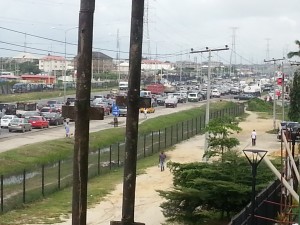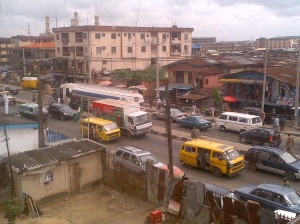Gbogbo olólùfẹ́ èdè Yorùbá, pataki àwọn ti o fi ìfẹ́ tẹ̀ lé àkọ-sílẹ̀ ọ̀rọ̀ gbígbé èdè àti àṣà Yorùbá́ lárugẹ lóri ẹ̀rọ ayélujára, mo jẹ yin ni àlàyé ohun ti ojú ri lẹhin àbọ̀ oko. Ẹ o ṣe akiyesi wípé, ìwé kikọ wa din kù diẹ nitori adarí ìwé lọ bẹ ilé wò fún ìgbà diẹ. Ni gbogbo àsìkò ti adarí ìwé fi wa ni ilé (Nigeria), ìṣòro nla ni lati lè kọ ìwé lori ayélujára nitori dákú-dájí iná mọ̀nà-mọ́ná.
Ó ṣeni lãnu pé “oko” ninu àlàyé yi (òkè-òkun/ìlú-oyinbo) sàn ju “ilé” Èkó. Lẹhin ọ̀pọ̀lọpọ̀ ọdún, “kàkà ki ewé àgbọn dẹ, koko ló tún nle si”. Ni totọ, àwọn Oní-ṣòwò ni orílẹ̀ èdè Nigeria ǹgbìyànjú, nitori kò rọrùn lati ṣòwò ni ìlú ti ohun amáyé-dẹrùn ti ìgbàlódé bi iná mona-mona, òpópónà tó dára, omi mimu, àbò, àti bẹbẹ̃ lọ, kò ti ṣe dẽde. A ṣe akiyesi pé nkan wọ́n ni ilé ju oko lọ, pataki ìnáwó lórí ounjẹ, ẹrọ iná mọ̀nà-mọ́ná àti ọkọ̀ wíwọ̀. Ai si iná, ariwo ẹ̀rọ iná mọ̀nà-mọ́ná, fèrè ọkọ̀ àti sún-kẹrẹ fà-kẹrẹ ọkọ̀ kò jẹ́ ki akọ̀we yi gbádùn ilé bi oko.
A lè sọ wípé àwọn Gómìnà ilẹ̀ Yorùbá ngbiyanju, ṣùgbọ́n “omi pọ̀ ju ọkà lọ”. Àyè iṣẹ́ ti ó yẹ ki Ìjọba àpapọ̀ ṣe ti wọn kò ṣe ńfa ìnira fún ará ìlú. “Ẹ̀bẹ̀ là ńbẹ òṣìkà ki ó tú ìlú rẹ̀ ṣe”, nitori eyi, a bẹ Ìjọba àti àwọn Gómìnà pé ki wọn sowọ́ pọ̀ lati tú orílẹ̀ èdè ṣe ni pataki ìpèsè ohun amáyé-dẹrùn.
ENGLISH TRANSLATION
I owe all the lovers of Yoruba language, particularly those following, lovingly the write up on promoting the Yoruba language and culture on the internet, an explanation on what was observed on return from the farm. You might have observed that there was a reduction in our publication because the Editor went to visit home for a little while. In all the time, the Editor was away in Nigeria, it was mostly difficult to publish on the internet because of the epileptic power supply.
It is a pity that “the farm” in this write up (Oversea/Europe) is better than “Home – Lagos”. After many years “Instead of the coconut leaf getting softer, it is getting harder”. Truly, the business men/women are trying because it is not easy to do business in the country where the infrastructure such as electricity, good road, potable water, security etc. are unstable. It is observed things are more expensive in the city than in the farm, particularly expenses on food, power generators and transportation. Lack of constant power supply, noise from generators, vehicular horning and traffic jam was a hindrance to enjoying home like the farm by the Editor.
It can be said that the Governors in Yoruba land are trying their best, but “more water than solid food”. The vacuum created by the neglect of the responsibilities of the Federal Government is causing inconvenience for the people. “We plead with the wicked to repair the country”, because of this, we appeal to the Federal Government and the Governors to cooperate to repair the country by providing the basic infrastructure.
Originally posted 2013-11-15 21:57:48. Republished by Blog Post Promoter




